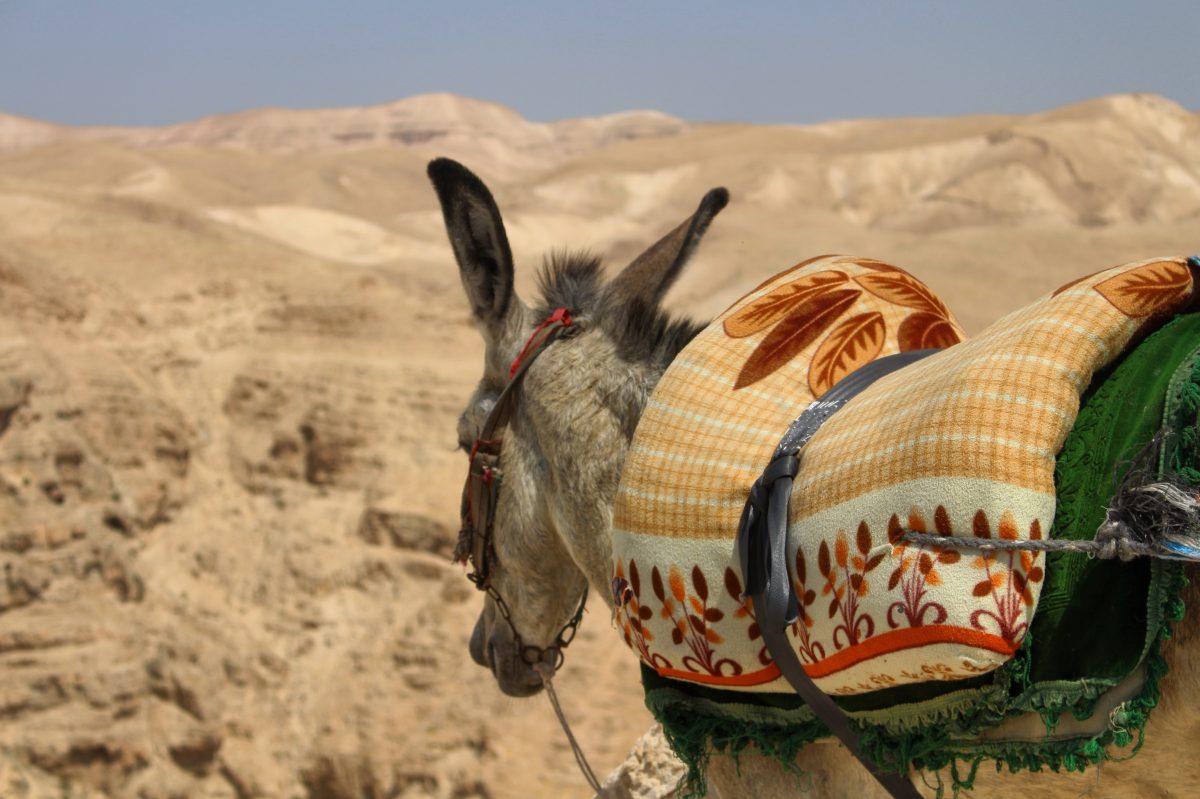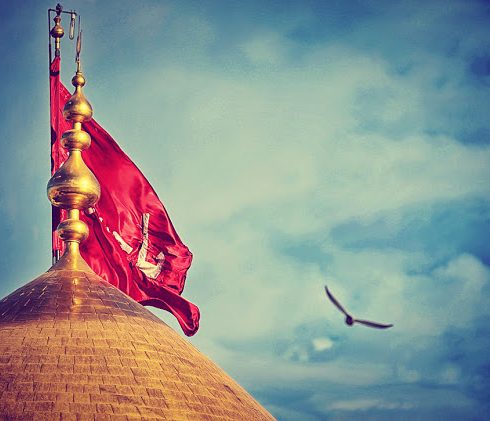مَثَلُ الَّذِينَ حُمِّلُوا التَّوْرَاةَ ثُمَّ لَمْ يَحْمِلُوهَا كَمَثَلِ الْحِمَارِ يَحْمِلُ أَسْفَارًا ۚ بِئْسَ مَثَلُ الْقَوْمِ الَّذِينَ كَذَّبُوا بِآيَاتِ اللَّهِ ۚ وَاللَّهُ لَا يَهْدِي الْقَوْمَ الظَّالِمِينَ
The example of those who were entrusted with the Torah and then did not take it on is like that of a donkey who carries volumes [of books]. Wretched is the example of the people who deny the signs of Allah. And Allah does not guide the wrongdoing people. (Qur’an 62:5)
Who are the people who were entrusted to carry the Torah?
They are the Jewish people (al-yahūd) in the specific sense, or all of BanuʾIsrāʾīl (children ofʾIsrāʾīl) in the general sense. Note here that BanuʾIsrāʾīl had twelve branches not just one, since Prophet Yaʿqūb (ʾIsrāʾīl) had twelve sons, and his progeny from these twelve sons are called BanuʾIsrāʾīl. One of the Prophet’s sons was named Yahūda (يهوذا), and therefore his progeny is known as al-yahūd.
The story of al-yahūd with the Torah
When Prophet Musa descended from Mount Sinai (جبل الطور) after receiving the revelation of the Torah, he found that BanuʾIsrāʾīl had deviated and began worshipping a golden calf which al-samiry (السامري) had produced for them to take as a god.
Allah (swt) had told Prophet Musa that he would be away from his people for thirty nights, after which He commanded him to extend the duration by ten more, so it became forty nights:
وَوَاعَدْنَا مُوسَىٰ ثَلَاثِينَ لَيْلَةً وَأَتْمَمْنَاهَا بِعَشْرٍ فَتَمَّ مِيقَاتُ رَبِّهِ أَرْبَعِينَ لَيْلَةً
And We made an appointment with Moses for thirty nights and perfected them by [the addition of] ten; so the term of his Lord was completed as forty nights. (Qur’an 7:142)
It was in these ten extra nights of Prophet Musa’s absence that BanuʾIsrāʾīl manufactured this calf and started prostrating to it in place of Allah (swt). Prophet Musa came to them while they were in this state of disbelief with the Torah in his hands and instructed them to take it and implement its teachings, which they rejected. He told them that they had wronged themselves and they had to repent for their transgression, and they were to receive a great punishment from Allah (swt) for their actions.
With Prophet Musa’s constant efforts to guide his people to the truth, BanuʾIsrāʾīl made a covenant to abide by the teachings of the Torah but this only lasted for a period of time. Eventually, they strayed from the truth and broke the covenant, and even began altering the contents of the Holy book. Of the many alterations they applied to the Torah was the changes they made to texts related to the Prophet Muhammad.
The Torah had informed the Jews about the coming of the Holy Prophet Muhammad – in fact the reason that the Jews originally migrated to Medina from Yemen and other areas, was in anticipation of the Prophet’s arrival. They even used to pray to Allah (swt) to grant them victory over the disbelievers whenever they had a battle, through the Prophet:
وَلَمَّا جَاءَهُمْ كِتَابٌ مِّنْ عِندِ اللَّهِ مُصَدِّقٌ لِّمَا مَعَهُمْ وَكَانُوا مِن قَبْلُ يَسْتَفْتِحُونَ عَلَى الَّذِينَ كَفَرُوا فَلَمَّا جَاءَهُم مَّا عَرَفُوا كَفَرُوا بِهِ ۚ فَلَعْنَةُ اللَّهِ عَلَى الْكَافِرِينَ
And when there came to them a Book from Allah confirming that which was with them – although before they used to pray for victory [by means of the Prophet] against those who disbelieved – but [then] when there came to them that which they recognised, they disbelieved in it; so the curse of Allah will be upon the disbelievers. (Qur’an 2:89)
Allah (swt) in the Holy Qur’an reminds and emphasises to the Jewish people that they certainly knew of the Prophet Muhammad, yet despite this they rejected him once he came. The falsification of Prophet Muhammad’s prophethood is only one of the alterations that BanuʾIsrāʾīl applied to the Torah. Of the many other matters which they distorted in their Holy book is the audacious accounts of the other Prophets and descriptions of dishonourable actions they supposedly committed which even non-believers and non-Muslims would be ashamed of committing. Unfortunately, there are many objectionable fabrications of this sort made about our Holy Prophets such as Prophet Nuh that have been inserted into the Torah.
Regardless of this issue of fabricating stories in the Torah, Allah (swt) sheds light on another matter in Surah Jumm’ah – which is that BanuʾIsrāʾīl were made to carry the Torah but they did not carry it (حُمِّلُوا التَّوْرَاةَ ثُمَّ لَمْ يَحْمِلُوهَا). What is meant by ‘carrying the Torah’ is to act upon the teachings that it contained. Banu ʾIsrāʾīl did not ‘carry’ the Torah in this sense, so Allah (swt) compares them to the donkey that carries books on its back (كَمَثَلِ الْحِمَارِ يَحْمِلُ أَسْفَارًا).
If you were to bring a donkey, and place on its back the most important and beneficial book, what will the donkey get out of it? Allah (swt) is saying that if you were to place volumes of valuable books (the word أَسْفَار is plural ofسفر which means a book which has great value) on the back of a donkey, it will not change. The donkey will remain a donkey and will not know how to read or change its habits at all. The valuable books will be of no benefit to it whatsoever.
The Muslim Ummah and the Qur’an
As Muslims, we have in our hands the Holy Qur’an which greatly surpasses the Torah in importance and status through what it holds of teachings. Allah (swt) commanded us as Muslims to embrace the Qur’an and hold on strongly to it, and for the Qur’an to be a source of guidance for us in our lives. He did not call for the Qur’an to be merely a book that we read in certain situations only, such as in the period of time before the adhan and at funerals. There are many Muslims who do not know anything about the Qur’an. When Allah (swt) revealed the Holy Qu’ran to the Prophet, He wanted the people to act upon its teachings and for it to be a constitution and source of law for the people. Allah (swt) gave us the Qur’an so that it can be a teacher and a guide for us, and specifically refers to the Qur’an as a light (nūr) – since lights are used by the human being to find guidance in a dark path:
قَدْ جَاءَكُم مِّنَ اللَّهِ نُورٌ وَكِتَابٌ مُّبِينٌ
There certainly has come to you from Allah a light and a clear Book. (Qur’an 5:15)
The life of the Arab at the time of the Prophet was total darkness in terms of their relationship with Allah (swt) and in terms of the social atmosphere. So Allah (swt) sent to them the Qur’an and compared it to a light so the people can find guidance in the darkness of disbelief, ignorance (jahiliyya) and kufr that they were in. He made the Qur’an a light with which He guides whom He pleases. However, many of the Arabs at the time of the Prophet did not embrace the Qur’an in the correct way.
Regrettably, even now the Muslims around the world do not hold on to the Qur’an as they should. The Qur’an has to be a source of guidance and law that we follow in all aspects of our life – for our relationship with Allah (swt), our relationship with our children, spouses, brothers and sisters, families, neighbours, our relationships with one another and our relationship with everything around us! However, have all the Muslims around the world implemented the Qur’an and held onto it as they should? I do not believe this is the case. We find that many of the Muslims do not know the true meaning of the Qur’an – especially in its practical meaning. They may know the method of memorisation and recitation of the Qur’an for example, but when it comes to practical implementation of the Qur’an in their lives we find countless Muslims are distant from the Qur’an to the maximum extent; it is this that holds the most danger for the Ummah.
Thus, it is essential that we hold onto the Qur’an in every way: recitation, memorisation, practical action and implementation, so that the example that applied to the Jews does not become applicable to the Muslims. For a people to have a book like the Holy Qur’an but not act upon its teachings is a huge calamity. For this reason, we must remain close to the Qur’an and memorise it’s teachings rather than just memorising it word for word. Once we do this, we will become as Allah (swt) describes:
خَيْرَ أُمَّةٍ أُخْرِجَتْ لِلنَّاسِ تَأْمُرُونَ بِالْمَعْرُوفِ وَتَنْهَوْنَ عَنِ الْمُنكَرِ وَتُؤْمِنُونَ بِاللَّهِ
The best Ummah ever raised for humanity—you encourage good, forbid evil, and believe in Allah. (Qur’an 3:110)
The above is a lecture by Sheikh Ali Merhi – it has been translated into English and summarised from Arabic, see the link below for the original lecture.






